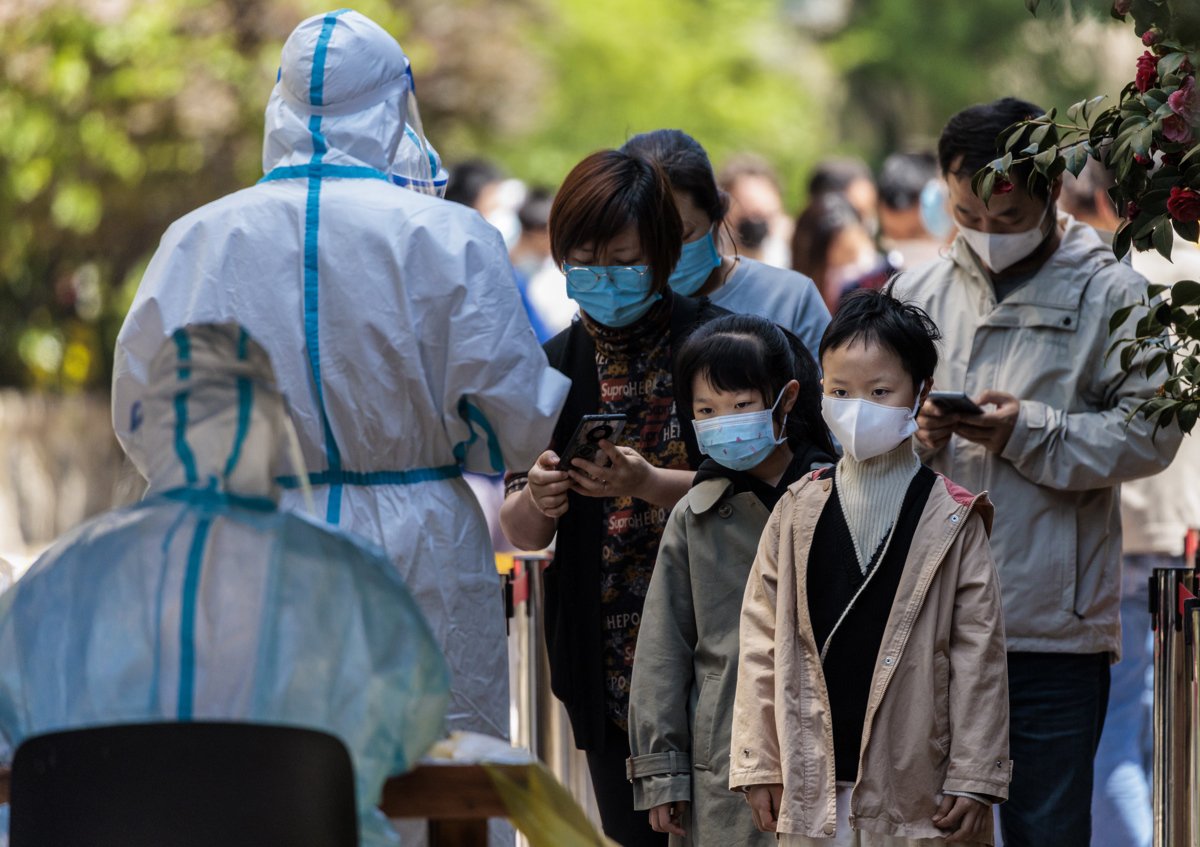the metropolis east china shanghai announced today its first three deaths from COVID-19 since the confinement began on March 28 to control the worst wave of infections since the pandemic began.
According to the city’s health authorities in a statement, the deceased were people between 89 and 91 years of age with “underlying health problems” who had not been vaccinated against the disease.
The low rate of inoculation among the elderly -one of the most vulnerable groups but also one of the most reluctant to be immunized- is one of the weak points of the Chinese strategy of zero tolerance against COVID-19, which implies massive campaigns of PCR, mobility restrictions and selective or general confinements in the cities where cases are detected.
In the case of Shanghai, out of 26 million inhabitants, only 38% of residents over 60 years of age -2.18 million people- have been vaccinated with the full schedule in addition to a booster dose, the director acknowledged this Sunday. from the local municipal health commission, Wu Jinglei.
The announcement of the deaths comes after the city, which is entering its fourth week of confinement, has recorded more than 320,000 infections, most of them asymptomatic, since Beijing does not count them as confirmed cases unless they show symptoms.
There are also 16 active serious cases in Shanghai, most of them unvaccinated elderly people with pathologies such as “diabetes, cerebrovascular and cardiovascular diseases, malignant tumors and lung problems,” according to the Global Times newspaper.
In recent days, some voices had already shown their disbelief at the absence of deaths in this wave, which has reminded the case of Wuhan, the city that registered the first cases of this pandemic at the end of 2019 and that remained confined for weeks. , when the local authorities revised the death toll upwards from 2,575 to 3,869 from one day to the next.
OUTBREAKS THROUGHOUT CHINA
The restrictions in Shanghai officially began on March 28, although by then there were already residential buildings that had been completely isolated for weeks. Despite the exhaustion of residents, who have reported food shortages or outright fear of ending up in isolation centers, the authorities remain adamant in their strategy, alleging that “Ómicron is not a flu” and that it could cause hundreds of deaths. and a hypothetical health collapse.
With the intention of “cleaning up” Shanghai, the metropolis will carry out a new round of massive tests for confined residents, local authorities announced today, with daily tests until the next day 21 for those who live in buildings in which positives are found.
While 2,417 local cases were recorded in Shanghai today, in addition to 19,831 asymptomatic cases, the number of infections has not stabilized in the rest of the country, with a constant trickle of positives in provinces such as Jilin (northeast, 166), Zhejiang (southeast, 34 ), Heilongjiang (northeast, 30), and Guangzhou (south, 25).
“We must concentrate our resources on winning this battle to avoid a large-scale outbreak and consolidate the results already achieved,” said Ma Xiaowei, director of the National Health Commission of China, according to the local press.
Ma stressed the importance of “welcoming a victorious XX Congress of the Communist Party”, in which this October the Chinese president and general secretary of the formation, Xi Jinping, is expected to revalidate his position at the head of the country with a third unprecedented mandate among his predecessors.
But the confinements, whether total or partial as in the case of Xi’an, one of the last cities to decree quarantine, are already having an impact on the economy, with stoppages in factories and transport that have set off the alarms of industries such as technology. or the automobile.
In that sense, Chinese Vice Premier Liu He, Xi’s most trusted man, stressed on Monday that more “efforts” are needed to “keep supply chains stable” and “improve conditions” for employees in the logistics industry. , which would result in the establishment of anticovid bubbles among workers to avoid bottlenecks.
At the moment, China’s gross domestic product (GDP) grew by 4.8% year-on-year in the first quarter of the year, although officials from the National Statistics Office (ONE) warned today of the “multiple challenges” posed by outbreaks.
Retail sales, a gauge of domestic consumption, rose 3.3% year-on-year in the third quarter – partly thanks to internet sales soaring 6.6% year-on-year – but contracted as much as 3.5% in March, acknowledged the ONE.
Efe/OnCuba.

















